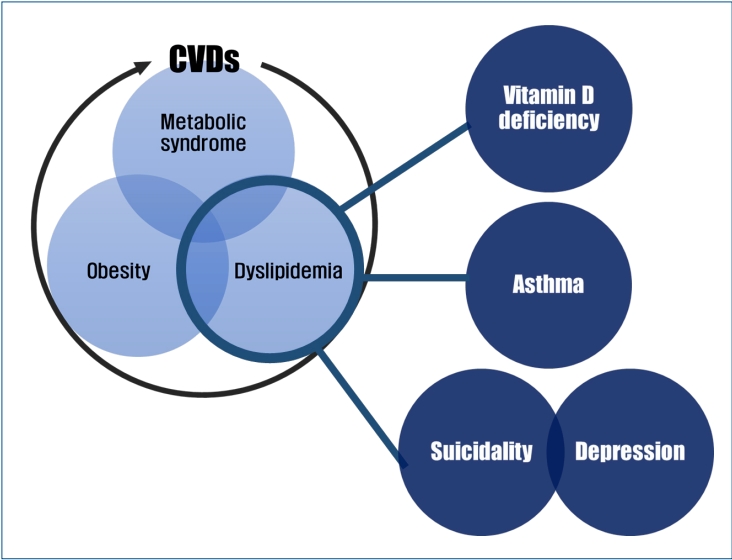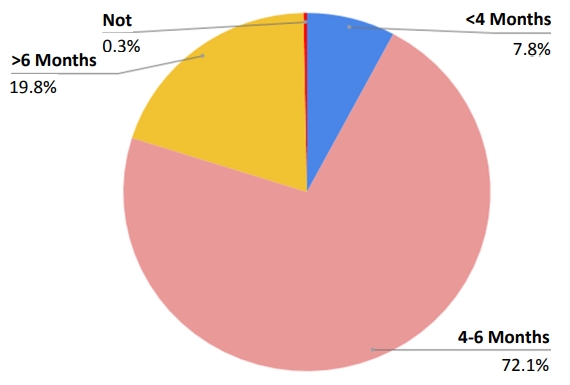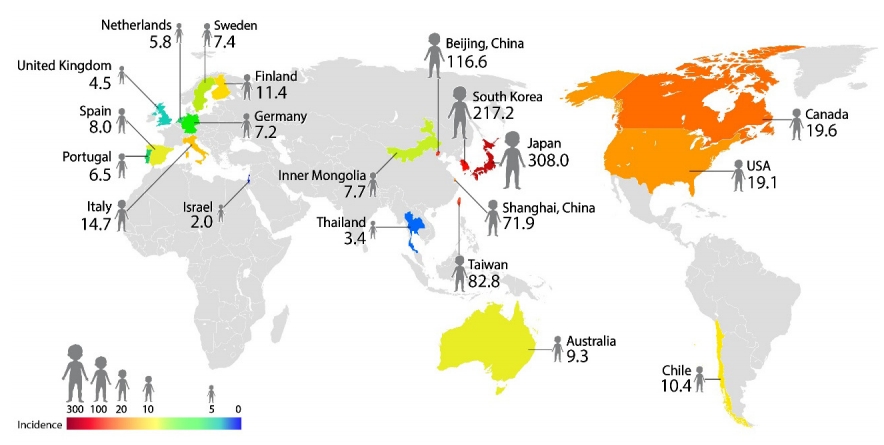Search
- Page Path
-
- HOME
- Search
- Review Article
- Diet-related behaviors affecting health and substance use among children and adolescents
- Ji-Hyun Seo, Sochung Chung
-
Unhealthy diet-related behaviors and poor diet quality during childhood and adolescence are the main factors contributing to noncommunicable diseases such as obesity, dyslipidemia, diabetes, hypertension, and cardiometabolic syndrome. Unhealthy diet-related behaviors can become lifelong habits associated with mental health problems, including depression, anxiety, attention deficit hyperactivity disorder, and substance abuse issues such as smoking, drinking, and other chemical compounds. Children... -
DOI: https://doi.org/10.3345/cep.2023.01634 [Accepted]
- Original Article
- Nutrition
- Energy drink consumption among Korean adolescents: prevalence and associated factors
- Jee-Seon Shim, Jeong Mi Lee
- Clin Exp Pediatr. 2024;67(10):531-539. Published online September 24, 2024
-

Question: How prevalent is energy drink consumption among Korean adolescents and what are the associated factors?
Findings: The prevalence of energy drink consumption among Korean adolescents increased from 3.2% in 2014 to 12.2% in 2019. Energy drink consumption varies according to sociode-mographic and individual factors.
Meaning: Policies and educational strategies are needed to reduce energy drink consumption in adolescents.
- Review Article
- Allergy
- Action-plan and as-needed therapy in allergic rhinitis
- Hyeon-Jong Yang
- Clin Exp Pediatr. 2024;67(6):267-273. Published online May 21, 2024
-

· The guidelines may not work in the real world.
· An action-plan reflecting patient’s severity and variable of symptoms, values and preferences as well as the benefits and harms of treatment, may be a useful alternative.
· The action plan and as-needed therapy must include the following elements: when, what, how, and why.
· Action plan and as-needed therapy can help patients manage their symptoms more effectively.
- General Pediatrics
- Metabolic complications of obesity in children and adolescents
- Hyunjin Park, Jung Eun Choi, Seunghee Jun, Hyelim Lee, Hae Soon Kim, Hye Ah Lee, Hyesook Park
- Clin Exp Pediatr. 2024;67(7):347-355. Published online November 16, 2023
-

· Pediatric obesity increases the risk of metabolic complications (insulin resistance, dyslipidemia, nonalcoholic fatty liver disease) and long-term cardiovascular diseases.
· A new obesity definition and various indicators (continuous metabolic syndrome score, pediatric simple metabolic syndrome score, fatty liver index) have been proposed to evaluate children’s susceptibility to metabolic disorders.
· Laboratory and body composition tests in pediatric screenings can identify groups at high risk of metabolic complications of obesity.
- Other
- Children’s health affected by parent’s behavioral characteristics: a review
- Sung Eun Kim, Jongin Lee
- Clin Exp Pediatr. 2024;67(5):232-239. Published online August 21, 2023
-

· Parents’ occupational hazards, long working hours, and smoking behaviors should be modified adequately to minimize adverse health effects on their children.
· As of 2023, several diseases from fetal exposure to occupational hazards can be compensated with Industrial Accident Compensation Insurance in South Korea.
· A directed acyclic graph is recommended for medical research to control the effects of parents’ behaviors on children’s health.
- Gastroenterology
- Role of social media use in onset of functional gastrointestinal disorders in children
- Mauro Cinquetti, Vanessa Dargenio, Michele Fingerle, Carolina Marchiotto, Marco Biasin, Massimo Pettoello Mantovani, Flavia Indrio
- Clin Exp Pediatr. 2023;66(6):226-232. Published online December 21, 2022
-

· Social media use can cause adverse health outcomes, including gastrointestinal disorders, in children and adolescents.
· Recent findings have shown a high prevalence of social media use and decreased well-being in patients with functional gastrointestinal disorders.
· The biopsychosocial nature of functional gastrointestinal disorders and the clear influence of social media on the psychosocial lives of children suggests the likely involvement of social media in their development.
- General Pediatrics
- A new perspective on cholesterol in pediatric health: association of vitamin D metabolism, respiratory diseases, and mental health problems
- Jeana Hong
- Clin Exp Pediatr. 2022;65(2):65-72. Published online December 9, 2021
-

∙ Pediatric dyslipidemia is associated with several health problems besides cardiovascular diseases.
∙ There is a direct association between pediatric dyslipidemia and low serum vitamin D levels, asthma, and mental health problems regardless of body mass index.
∙ More large-scale nationally representative studies are needed to establish the appropriate cutoff points for the definition of dyslipidemia that is a prerequisite for further epidemiological studies in the Korean pediatric population.
- Original Article
- Allergy
- Cohort profile: National Investigation of Birth Cohort in Korea study 2008 (NICKs-2008)
- Ju Hee Kim, Jung Eun Lee, So Min Shim, Eun Kyo Ha, Dong Keon Yon, Ok Hyang Kim, Ji Hyeon Baek, Hyun Yong Koh, Kyu Young Chae, Seung Won Lee, Man Yong Han
- Clin Exp Pediatr. 2021;64(9):480-488. Published online January 5, 2021
-

This national cohort study included all Korean children born in 2008 and 2009 observed over a period of more than 10 years. Our findings demonstrate that it is possible to analyze disease onset prior to hospitalization based on information such as lifestyle, eating habits, and risk factors by integrating National Health Insurance System data with national health screening data.
- Neonatology (Perinatology)
- Knowledge and perceptions of kangaroo mother care among health providers: a qualitative study
- Hadi Pratomo, Tiara Amelia, Fatmawati Nurlin, Asri C. Adisasmita
- Clin Exp Pediatr. 2020;63(11):433-437. Published online July 21, 2020
-

Question: What are health providers’ knowledge and perceptions of Kangaroo mother care (KMC)?
Finding: Health providers’ knowledge of KMC was sufficient; however, some of their perceptions about it could create barriers to the successful implementation of hospital KMC programs.
Meaning: Health providers’ perceptions about KMC should be considered to ensure successful KMC implementation. Locally designed on-site training programs could overcome the challenges.
- Review Article
- Other
- Review of epidemiological studies on air pollution and health effects in children
- Jong-Tae Lee
- Clin Exp Pediatr. 2021;64(1):3-11. Published online June 10, 2020
-

This review summarized the accumulated epidemiologic evidence with emphasis on studies conducted in Korea and heterogeneity in the literature. Based on systematic reviews and meta-analyses, there is consistent evidence on the association between exposure to ambient air pollution and children’s health, especially respiratory health and adverse birth outcomes, and growing evidence on neurodevelopmental outcomes.
- Cardiology
- Reality of Kawasaki disease epidemiology
- Gi Beom Kim
- Clin Exp Pediatr. 2019;62(8):292-296. Published online July 9, 2019
-

Epidemiologic studies of Kawasaki disease (KD) have shown a new pattern or change of its occurrence suggestive of its pathophysiology or risk factors from the first patient with KD reported in 1961. The incidence of KD in Northeast Asian countries including Japan, South Korea, China, and Taiwan is 10–30 times higher than that in the United States and Europe. Knowing...
- Original Article
- Developmental and Behavioral Medicine
- Mid-upper-arm circumference as a screening measure for identifying children with elevated body mass index: a study for Pakistan
- Muhammad Asif, Muhammad Aslam, Saima Altaf
- Clin Exp Pediatr. 2018;61(1):6-11. Published online January 22, 2018
-

Purpose Mid-upper-arm circumference (MUAC) is considered an alternative screening method for obesity. The aims of this investigation were to examine the ability of MUAC to correctly identify children with elevated body mass index (BMI) and to determine the best MUAC cutoff point for identification of children with high BMI.
Methods Anthropometric measurements (height, weight, and MUAC) from a cross-sectional sample of 7,921 Pakistani...
- Neonatology (Perinatology)
- Healthcare access challenges facing six African refugee mothers in South Korea: a qualitative multiple-case study
- Min Sun Kim, In Gyu Song, Ah Reum An, Kyae Hyung Kim, Ji Hoon Sohn, Sei Won Yang
- Clin Exp Pediatr. 2017;60(5):138-144. Published online May 31, 2017
-
Purpose Following legal reform in 2013, the annual number of asylum seekers entering South Korea has increased from 1,143 in 2012 to 5,711 in 2015. We interviewed six African refugee mothers of young children regarding their health needs and barriers to access maternal child health services.
Methods We recruited mothers who had visited a clinic for immigrants between July 2013 and August 2015....
- Nutrition
- Maternal food restrictions during breastfeeding
- Goun Jeong, Sung Won Park, Yeon Kyung Lee, Sun Young Ko, Son Moon Shin
- Clin Exp Pediatr. 2017;60(3):70-76. Published online March 27, 2017
-
Purpose This study investigated self-food restriction during breastfeeding, reviewed the literature showing the effect of maternal diet on the health of breast-fed infants, and explored the validity of dietary restrictions.
Methods Questionnaire data were collected from breastfeeding Korean mothers who visited the pediatric clinic of Cheil General Hospital & Women's Healthcare Center from July 2015 through August 2015. The survey included items assessing...
- Review Article
- The promotion of mental health and the prevention of mental health problems in child and adolescent
- Sun Mi Cho, Yun Mi Shin
- Clin Exp Pediatr. 2013;56(11):459-464. Published online November 27, 2013
-
Improving mental health and reducing the burden of mental illness are complementary strategies which, along with the treatment and rehabilitation of people with mental disorders, significantly improve population health and well-being. A Institute of Medicine report describes a range of interventions for mental disorders that included treatment and maintenance, reserving the term "prevention" for efforts that occur before onset of...
- Vitamin D status and childhood health
- Youn Ho Shin, Hye Jung Shin, Yong-Jae Lee
- Clin Exp Pediatr. 2013;56(10):417-423. Published online October 31, 2013
-
Vitamin D is an essential component of bone and mineral metabolism; its deficiency causes growth retardation and skeletal deformities in children and osteomalacia and osteoporosis in adults. Hypovitaminosis D (vitamin D insufficiency or deficiency) is observed not only in adults but also in infants, children, and adolescents. Previous studies suggest that sufficient serum vitamin D levels should be maintained in...
- The current status of the Korean student health examination
- Hye-Jung Shin
- Clin Exp Pediatr. 2013;56(8):313-322. Published online August 27, 2013
-
Recent trends place an emphasis on school health care, the ultimate goal of which is to protect, maintain, and promote students' health. School health care is a program that integrates health care services, health education, health counseling, and local social health services. The student health examination (SHE) system is a part of school health care and schools and communities must...
- Original Article
- Vitamin D deficiency in infants aged 1 to 6 months
- You Jin Choi, Moon Kyu Kim, Su Jin Jeong
- Clin Exp Pediatr. 2013;56(5):205-210. Published online May 28, 2013
-
Purpose The aim of this study was to recognize the state of vitamin D among healthy infants aged 1 to 6 months in South Korea, and also to identify the risk factors affecting the level of vitamin D.
Methods A total of 117 infants were enrolled in this study for 12 months, from March 1, 2011 to February 29, 2012. Serum levels of...
- Review Article
- Smoking and adolescent health
- Sang-hee Park
- Clin Exp Pediatr. 2011;54(10):401-404. Published online October 31, 2011
-
With the Westernization and opening of our society, adolescents' smoking is increasing and being popularized. Many adolescents start smoking at an early age out of curiosity and venturesomeness, and earlier start of smoking makes it more difficult to quit smoking. Adolescents' habitual smoking not only becomes a gateway to all kinds of substance abuse but also causes various health problems...
- Current health issues in Korean adolescents
- Chang Ho Hong
- Clin Exp Pediatr. 2011;54(10):395-400. Published online October 31, 2011
-
During the adolescent period, they experience rapid physical, emotional, cognitive developments while they establish their lifestyle and habitual routines that strongly influence adult health and life. Recent rapid economic growth in Korea, and the earlier onset of physical, sexual, and psychological maturation of adolescents, has resulted in changes in the health status of adolescents from many years ago. Risk-taking behaviors...
- Original Article
- One-year evaluation of the national health screening program for infants and children in Korea
- Jin Soo Moon, Soon Young Lee, Baik-Lin Eun, Young Key Kim, Young Key Kim, Son Moon Shin, Hea Kyoung Lee, Hee Jung Chung
- Clin Exp Pediatr. 2010;53(3):307-313. Published online March 15, 2010
-
Purpose:Results of the Korea National Health Screening Program for Infants and Children, which was launched in November 2007, were evaluated for future research and policy development. Methods:Data from a total of 2,729,340 cases were analyzed. Five visiting ages, such as 4, 9, 18, 30, and 60 months, were included. Several parameters such as stunting, obesity, and positive rate of developmental... -
- The current child and adolescent health screening system: an assessment and proposal for an early and periodic check-up program
- Baik-Lin Eun, Jin Soo Moon, So-Hee Eun, Hea Kyoung Lee, Son Moon Shin, In Kyung Sung, Hee Jung Chung
- Clin Exp Pediatr. 2010;53(3):300-306. Published online March 15, 2010
-
Purpose : Recent changes in the population structure of Korea, such as rapid decline in birth rate and exponential increase in old-aged people, prompted us to prepare a new health improvement program in children and adolescents. Methods : We reviewed current health screenings applied for children and adolescents in Korea and other developed countries. We collected and reviewed population-based data... -
- The societal cost of rotavirus infection in South Korea
- Bong Min Yang, Dae Sun Jo, Youn Hee Kim, Ji Min Hong, Jung Soo Kim
- Clin Exp Pediatr. 2008;51(9):977-986. Published online September 15, 2008
-
Purpose : This study aims to estimate the financial cost of rotavirus infection in Korea in the year of 2005. Methods : The incidence rates used were from the epidemiological profile at Jeoungeub District (5.8 cases/1,000 children <5 years old for inpatients, and 22.65 cases/1,000 children <5 years old for outpatients, per year). The health care cost per capita of rotavirus... -
- Erratum
- About the new edition of child and adolescent health record book
- Young Kyoo Shin
- Clin Exp Pediatr. 2008;51(9):907-910. Published online September 15, 2008
-
Recently we published new edition of `child & Adolescent health record book` considering easy usability and introduction of new vaccines. This record book has essential and important contents for caring our children and adolescents. Currently many people use various vaccination record books with wrong and poor contents. We suggest the campaign that every pediatrician must give our well made record... -
- Original Article
- Therapeutic compliance and its related factors in pediatrics patients
- Ki Soo Park, Sin Kam, Heung Sik Kim, Jeong Kwon Lee, Jin-Bok Hwang
- Clin Exp Pediatr. 2008;51(6):584-596. Published online June 15, 2008
-
Purpose : This study was conducted to investigate treatment compliance and related factors in pediatric patients. Methods : Three hundred and fifty-five patients diagnosed with various acute diseases at a teaching hospital or clinic in October 2003 were enrolled. Data were analyzed using the Health Belief Model, which includes items on self-efficacy and family assistance. Results : The study found that... -
- Review Article
- A suggestion of health insurance for children
- Baik-Lin Eun
- Clin Exp Pediatr. 2008;51(4):339-342. Published online April 15, 2008
-
The Korean Health Insurance (KHI) has been introduced since 1977 and it took only 12 years that KHI had accomplished the total coverage of Korean population. The remarkable success of KHI can be compared with other OECD countries which had taken some 30 years to over 100 years to establish the total coverage of the population. Life expectancy at birth... -
- Overview of the national health screening program for infant and children
- Baik-Lin Eun, Seong Woo Kim, Young Key Kim, Jung Wook Kim, Jin Soo Moon, Su Kyung Park, In Kyung Sung, Son Moon Shin, Sun Mi Yoo, So Hee Eun, Hea Kyoung Lee, Hyun Taek Lim, Hee Jung Chung
- Clin Exp Pediatr. 2008;51(3):225-232. Published online March 15, 2008
-
The mission of National Health Screening Program for Infant and Children is to promote and improve the health, education, and well-being of infants, children, families, and communities. Although the term 'diagnosis' usually relates to pathology, a similar diagnostic approach applies to the child seen primarily for health supervision. In the case of health, diagnosis determines the selection of appropriate health... -
- Original Article
- Analysis of cytosine adenine(CA) repeat polymorphism of the IGF-I gene and influence on serum IGF-I levels in healthy children and adolescents
- Myung Jin Ko, Tae Gyu Hwang, Jeong Nye Lee, Woo Yeong Chung
- Clin Exp Pediatr. 2006;49(12):1340-1347. Published online December 15, 2006
-
Purpose : The aim of the present study was to investigate the role of polymorphic cytosine adenine (CA) repeat of the IGF-I gene in the age-related alterations of serum IGF-I levels in healthy children. Methods : Two hundred and forty three normal healthy children (136 boys; 107 girls) aged between 7 and 15 years were enrolled in the present study. The... -
- Review Article
- Report about the health status of Korean adolescents - A comprehensive overview of the Korean adolescent health through demographics -
- Hea Kyoung Lee
- Clin Exp Pediatr. 2006;49(12):1267-1274. Published online December 15, 2006
-
-
- Original Article
- Health status of children in low socioeconomic conditions
- Hee Kyoung Choi, Jeong A Her, Seong Hee Jang, Dal Hyun Kim, Kyoung Lim Yoon, Young Min Ahn
- Clin Exp Pediatr. 2006;49(1):24-28. Published online January 15, 2006
-
Purpose : The purpose of this study was to investigate the health status and nutritional condition of children living in a low-income community through anthropometric, laboratory evaluation. Methods : A community-based survey identified children below 15 years living in a low-income community. Their weight, height, visual acuity, hearing level and dental status were measured. Blood sample were obtained on June and... -
-

-
-
Impact Factor3.2
-
8.02023CiteScore94th percentilePowered by
-









